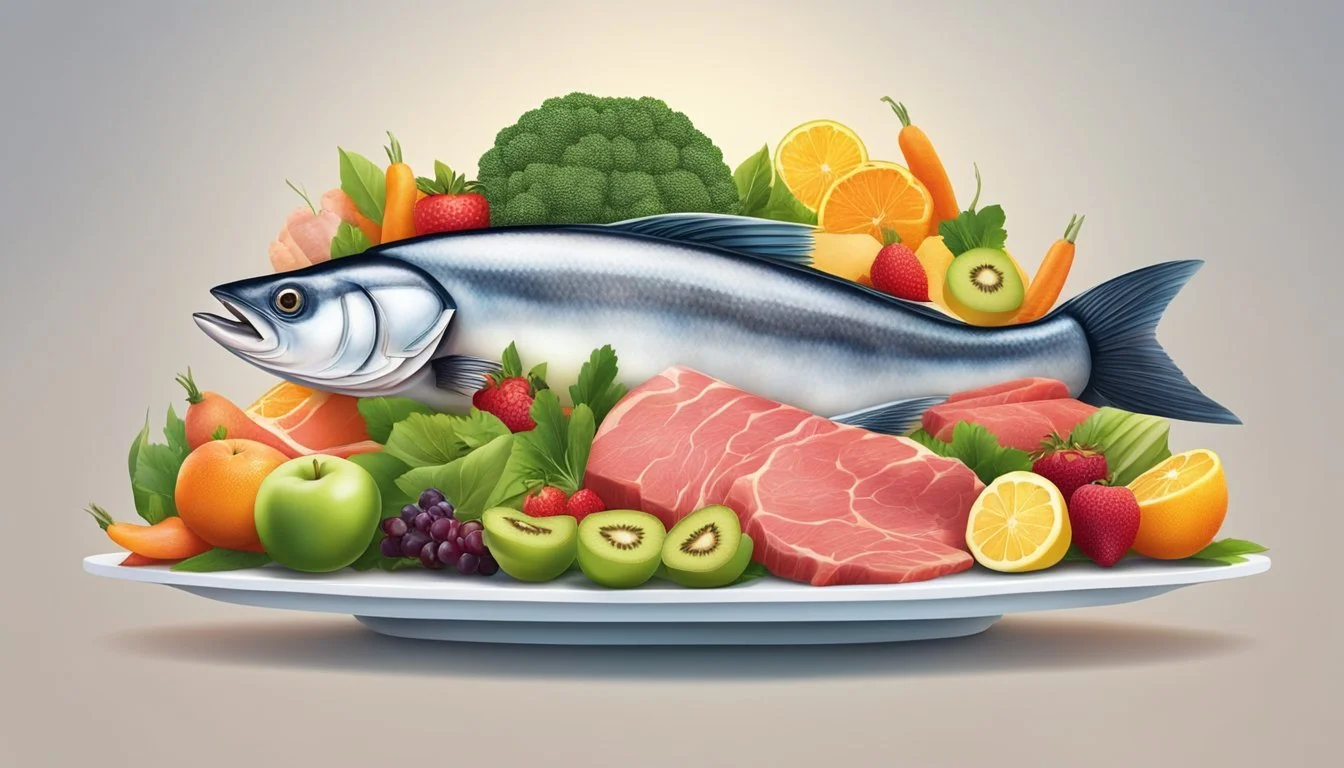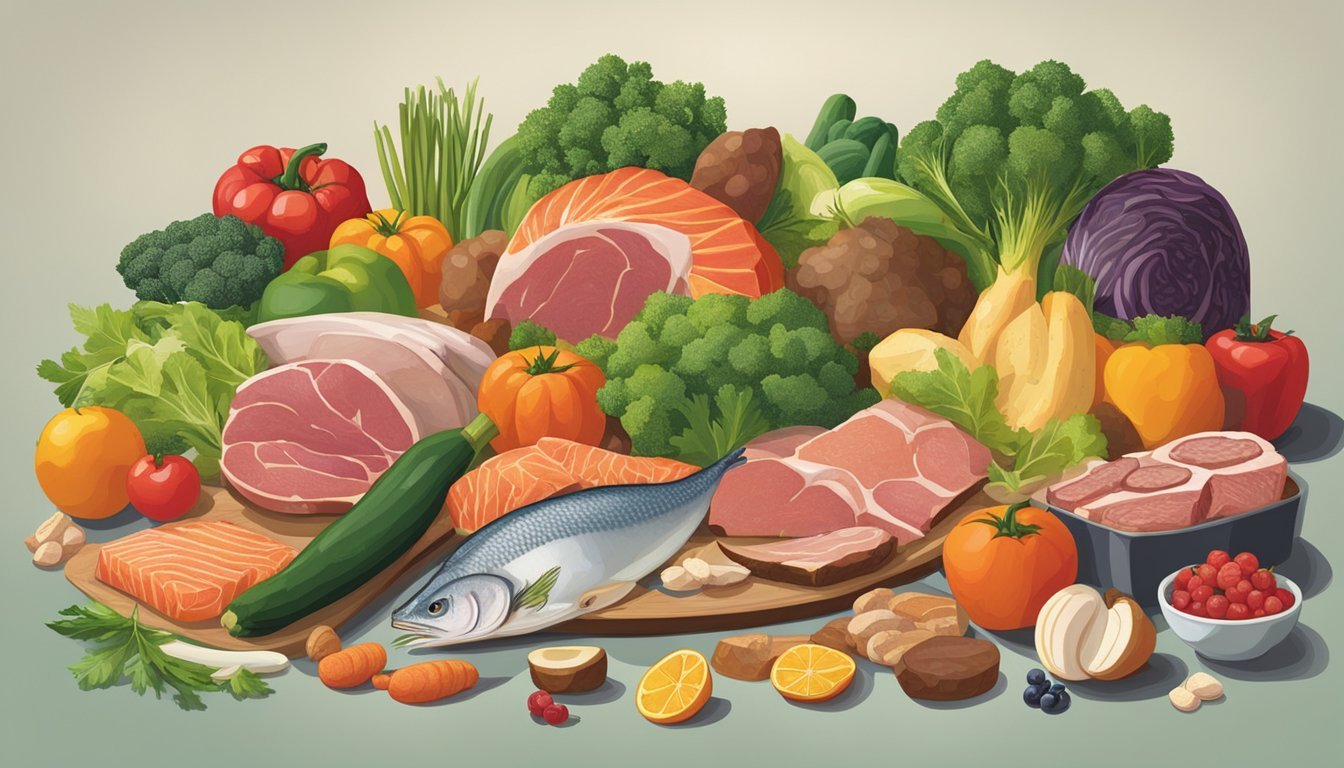Carnivore Diet vs. The Perricone Diet
Evaluating Skin Health Benefits and Anti-Inflammatory Properties
The Carnivore Diet and the Perricone Diet represent two contrasting nutritional philosophies centered around the impact of diet on overall health, particularly skin health and inflammation. The Carnivore Diet is a regimen comprising solely animal products, advocating for a high intake of proteins and fats from meat, eggs, and dairy. Proponents believe that the diet's reliance on animal-based foods can lead to improved skin health by eliminating potential irritants found in processed foods and certain plant-based items.
Alternatively, the Perricone Diet, developed by Dr. Nicholas Perricone, is founded on the principle of anti-inflammatory nutrition. This approach emphasizes a diet rich in omega-3 fatty acids, proteins, and fiber, focusing on whole foods like seafood, poultry, and green vegetables. It postulates that a diet designed to combat inflammation can prevent and repair skin damage, leading to a healthier complexion.
Both diets pose potential benefits for skin health through their unique strategies: the Carnivore Diet by its elimination of commonly inflammatory food groups and the Perricone Diet through its targeted inclusion of anti-inflammatory foods. However, these diets' approaches to nutrition and their impact on health are subject to ongoing debate, highlighting the complexity of diet's role in managing inflammation and maintaining skin health.
Understanding the Carnivore Diet
The Carnivore Diet focuses on consuming exclusively animal-based products and is often considered for its effects on body composition and certain health outcomes. Its implications for skin health are a subject of both interest and debate.
The Role of Animal Products in Skin Health
Animal products are rich in nutrients like collagen, which can benefit the skin's elasticity and appearance. Meat, specifically, provides amino acids that are essential for collagen synthesis. Fish, a staple in the Carnivore Diet, contains omega-3 fatty acids, which are known for their anti-inflammatory properties and may contribute to skin health. However, it is important to consider the balance of nutrients and the potential lack of certain vitamins typically found in plant-based foods.
Potential Benefits of High Protein Intake
A high-protein diet, such as the Carnivore Diet, may support muscle mass maintenance and growth due to its abundance in protein sources like meat, fish, eggs, and some dairy products. This can be particularly beneficial for the body's overall composition and the healing processes of the skin due to the role protein plays in tissue repair.
Risks and Considerations
While the Carnivore Diet may provide a simple approach to eating, its highly restrictive nature can lead to deficiencies in vitamins and minerals that are typically obtained from plant-based foods. A lack of variety in the diet can increase the risk of heart disease due to a potential increase in the consumption of saturated fats. It's crucial for individuals to be aware of these risks and consider supplementation or dietary adjustments to compensate for the potential nutrient deficiencies.
Advocates' Experiences with Skin Conditions
Individuals who follow the Carnivore Diet sometimes report improvements in skin conditions, suggesting a correlation with reduced inflammation due to the elimination of plant-based irritants. Advocates claim that cutting out plant foods may lead to a decrease in systemic markers of inflammation such as C-reactive proteins. However, these experiences are anecdotal, and comprehensive scientific studies are needed to establish a clearer connection between the diet and skin health improvements.
Exploring the Perricone Diet
The Perricone Diet is designed to promote skin health and reduce inflammation by emphasizing a nutrient-dense, whole foods-based intake. This dietary approach favors foods high in antioxidants, healthy fats, and fiber, and it's targeted towards not only improving skin appearance but also enhancing overall wellness.
Incorporation of Anti-Inflammatory Foods
The foundation of the Perricone Diet is a selection of anti-inflammatory foods. This includes a variety of nuts and seeds, which are abundant sources of healthy fats and vitamins that help modulate the body's inflammatory response. Regular consumption of foods rich in omega-3 fatty acids, such as salmon, forms a critical aspect of the diet, supporting both cardiovascular health and skin elasticity.
Emphasis on Fruits, Vegetables, and Omega-3s
An essential pillar of the diet is a high intake of fruits and vegetables which are loaded with vitamins A and C, iron, and zinc. These components are crucial for maintaining healthy skin and immune function. Omega-3 fatty acids are another focal point, with an emphasis on including salmon, avocado, and olive oil, all known for their substantial omega-3 content.
Skin Health Through Antioxidant-Rich Choices
Antioxidants play a significant role in the Perricone Diet, with a spotlight on berries, beans, and whole grains. These foods are celebrated for their capacity to combat oxidative stress, an underlying cause of skin aging and inflammation. Vitamin C-rich foods, alongside other antioxidant powerhouses, are prioritized for their skin-rejuvenating properties.
Dietary Restrictions and Flexibility
While the diet underscores the importance of fiber and antioxidants, it also recognizes the need for flexibility, permitting modifications based on individual needs. Certain dietary restrictions emphasize reducing intake of processed foods, added sugars, and high-glycemic carbohydrates. The focus remains on a balanced intake of nutrient-dense foods that support both health and skin vitality.
Comparative Analysis of Nutritional Profiles
In examining the Carnivore Diet and the Perricone Diet, it is critical to compare their nutritional content, particularly in terms of protein, fats, vitamins and minerals, and their effect on blood sugar and energy levels, as well as their balance of fatty acids, which are paramount for skin health and anti-inflammatory properties.
Protein and Fat Comparisons
The Carnivore Diet is characterized by a high intake of animal-based proteins and saturated fats, with nearly zero carbohydrate consumption. Proteins are primarily sourced from meats, including organ meats, which are rich in nutrients but also high in cholesterol and saturated fat. In contrast, the Perricone Diet emphasizes protein sources like cold-water fish, poultry, and tofu, which tend to be leaner and lower in saturated fats. This diet includes a moderate amount of fats from sources such as fish, nuts, and seeds, which provide a healthier balance of monounsaturated and polyunsaturated fats.
Vitamin and Mineral Content
Vitamins and minerals are distributed differently between the two diets. The Carnivore Diet may lead to deficiencies in certain vitamins, such as Vitamin C and certain B vitamins, which are typically found in plant-based foods. Conversely, this diet is rich in B12 and iron, which are abundant in red meat. The Perricone Diet provides a diverse array of vitamins and minerals thanks to its inclusion of fruits, vegetables, and whole grains. It is particularly rich in antioxidants, which are crucial for skin health.
Impact on Blood Sugar and Energy Levels
The Carnivore Diet's lack of carbohydrates means it may have a stable effect on blood sugar levels, potentially beneficial for those with diabetes or insulin resistance. However, this can also result in limited sources of fiber, which is important for energy stability. The Perricone Diet includes low-glycemic carbohydrates like oatmeal and sweet potatoes, which are digested slowly, helping to maintain steady blood sugar and energy levels throughout the day.
Balancing Omega-6 and Omega-3 Fatty Acids
A balance between omega-6 and omega-3 fatty acids is essential for reducing inflammation. The Carnivore Diet typically includes a higher ratio of omega-6 fatty acids due to the consumption of certain meats, which can promote inflammation if not balanced. The Perricone Diet, with its focus on fish such as salmon and sardines, provides an ample amount of omega-3 fatty acids, which are known for their anti-inflammatory effects and are beneficial for skin health.
Effects on Skin Health and Conditions
The Carnivore and Perricone diets may have distinct impacts on skin health, particularly concerning inflammatory skin conditions and the body’s collagen production. Each diet has its proponents and reported benefits for skin-related issues.
Acne and Eczema: Diet's Influence
The Carnivore diet, with its high-protein content and exclusion of potential irritants like sugar and refined carbohydrates, has been associated with improvements in inflammatory skin conditions such as acne and eczema. Anecdotal reports mention individuals experiencing fewer flare-ups and reduced severity of symptoms after adopting this diet. Conversely, the Perricone diet emphasizes anti-inflammatory foods which can also benefit these conditions by promoting a healthy skin environment conducive to healing.
Skin Elasticity and Collagen Production
Carnivore Diet: A focus on protein-rich foods such as meats which contain amino acids, essential for collagen synthesis, potentially supporting skin elasticity.
Perricone Diet: Recommends omega-3 rich seafood and poultry, also important for maintaining skin health and assisting in collagen production to sustain skin's firmness and structure.
Anti-Inflammatory Benefits for Skin
Both diets claim anti-inflammatory effects that may benefit skin health:
Carnivore Diet: Elimination of processed foods might reduce inflammation, purportedly reducing skin issues like psoriasis.
Perricone Diet: Endorses a variety of whole foods, including fatty fish high in omega-3s, known to possess anti-inflammatory properties that support skin health.
Consulting Healthcare Professionals
It's essential to consult healthcare professionals, such as a dermatologist or dietitian, before making diet changes for skin health. They can provide individualized advice considering personal health history and specific skin conditions. Always ensure decisions related to diet and skincare are informed by a healthcare professional's guidance.
Weight Management Perspectives
Evaluating the effectiveness of the Carnivore and The Perricone diets highlights the diverse approaches to weight management. Each diet has a distinct focus on nutritional content that may influence weight loss, energy levels, satiety, and exercise performance.
Carnivore and High Protein Diets for Weight Loss
The Carnivore Diet is a high-protein, low-carbohydrate diet that primarily includes animal products. Advocates suggest that the high protein content can lead to increased satiety and reduced appetite, which may help with weight loss. However, the lack of plant-based nutrients and potential for increased saturated fat intake raises concerns for long-term health. Individuals choosing this diet for weight management should consider the potential need for monitoring and moderation to maintain overall health.
The Perricone Diet and Satiety
The Perricone Diet emphasizes anti-inflammatory foods rich in antioxidants and omega-3 fatty acids. This diet includes lean proteins like chicken and turkey, as well as seafood such as salmon and scallops. A key benefit often associated with The Perricone Diet is satiety; foods in this diet are not just nutrient-dense but also help maintain stable blood sugar levels, which can prevent overeating and support weight loss efforts. Adherence to this balanced approach has been shown to be more sustainable due to its variety and nutrient engagement.
Diet and Exercise Synergy
Both diets exert different impacts on exercise performance and energy levels. The Carnivore Diet, while high in protein, may not provide all the necessary carbohydrates that are the primary fuel used during prolonged or high-intensity exercise, potentially affecting energy levels and workout intensity. On the other hand, The Perricone Diet, with a balanced intake of macronutrients, may better support energy levels needed for regular physical activity, enhancing the synergistic effect of diet and exercise for weight management. Dieters should consider their lifestyle and exercise routine when selecting the best dietary approach to support their weight management and overall health goals.
Considerations for Long-Term Health
When considering the Carnivore Diet and the Perricone Diet for long-term health, one must weigh potential nutrient deficiencies, heart disease risks, and the diets' influence on hormones and sebum production.
Navigating Potential Nutrient Deficiencies
The Carnivore Diet, with its exclusion of nuts, grains, seeds, and vegetables, can lead to deficiencies in essential vitamins and minerals normally found in these foods. The Perricone Diet, on the other hand, includes these nutrient-dense foods which can help mitigate such shortages. Table 1 shows nutrients commonly deficient in meat-only diets and their sources that are included in the Perricone Diet.
Table 1: Nutrient Sources in the Perricone Diet
Vitamin C
Sources: Fruits, leafy greens
Fiber
Sources: Nuts, seeds, vegetables
Vitamin E
Sources: Nuts, seeds, leafy greens
Polyphenols
Sources: Berries, olive oil
Heart Disease Risks and Diet
A meat-intensive diet such as the Carnivore Diet is typically high in saturated fats, which can raise LDL cholesterol levels, potentially increasing the risk of heart disease. Including a variety of foods as recommended by the Perricone Diet can help balance fat intake and may reduce these risks.
Influence of Diet on Hormones and Sebum Production
The kinds of foods consumed can affect hormone levels and sebum production, both of which impact skin health. Diets high in processed meats and saturated fats (often seen in a carnivore diet) may influence hormone balance and exacerbate acne by increasing sebum production. The Perricone Diet's emphasis on anti-inflammatory foods may support healthier skin and hormonal balance.
Dietary Adaptations and Sustainability
When individuals consider shifting between the Carnivore and the Perricone Diet, understanding the sustainability of dietary adaptations is crucial. This involves the ease of transition, potential integrated approaches, and seeking guidance from healthcare professionals.
Transitioning Between Diets
Shifting from a Carnivore to the Perricone Diet involves significant changes, as one transitions from a diet high in animal products to one that incorporates a variety of foods including plant-based options. Sustainability of the transition relies on:
Gradual incorporation of anti-inflammatory foods like:
Wild salmon
Leafy greens
Berries
Nuts and seeds
Reducing intake of meats and animal products in stages
Monitoring nutrient intake to ensure deficiencies do not arise
Individuals should follow a structured plan to maintain nutritional balance and minimize digestive distress.
Potential for Integrative Approaches
An integrative approach combines elements of both diets to achieve the desired health outcomes. Such an approach can be suitable for those seeking a balance between the high intake of animal products and the anti-inflammatory benefits of the Perricone Diet. Key considerations include:
Restricting processed foods and sugar while incorporating more fatty fish and antioxidant-rich fruits and vegetables
Balancing omega fatty acids to support skin health
Customizing the diet based on the individual's health status, exercise routine, and lifestyle
Role of Healthcare and Dietary Professionals
Consulting with healthcare and dietary professionals is essential to ensure sustainability and success. They provide:
Personalized guidance by a registered dietitian on how to adapt one's diet without compromising nutrient intake
Regular follow-ups to address potential health concerns and adapt the diet as needed
Educational resources on the selection and preparation of diverse foods
Healthcare professionals help in creating a diet that aligns with the individual's health goals while considering the implications of dietary restrictions.







